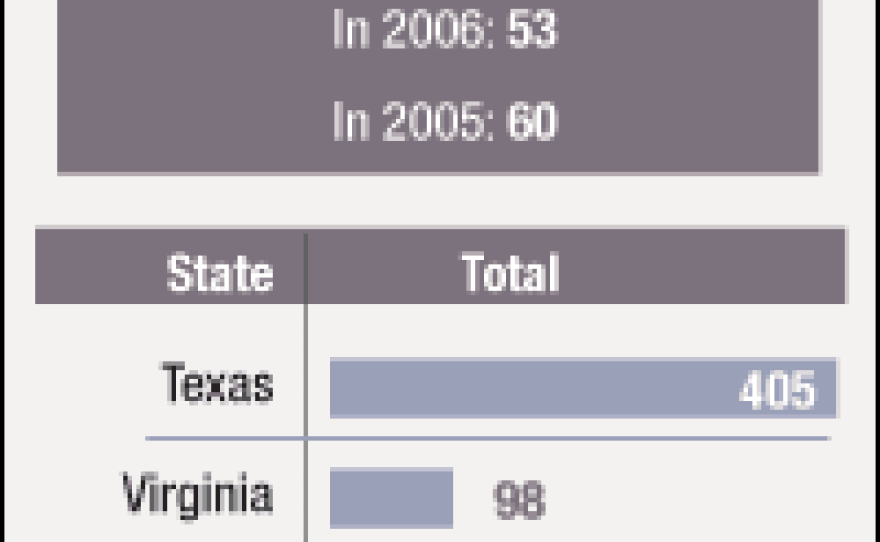
Georgia is scheduled to execute two inmates by lethal injection later this month, despite legal questions that have been raised about whether the method amounts to cruel and unusual punishment.
Some states have put executions on hold as the issue works its way through the legal system.
The Supreme Court announced on Sept. 25 it would hear a lethal injection case out of Kentucky. Two death row inmates in that state are questioning whether the lethal injection as administered there is cruel and unusual punishment.
Texas Pressed On Despite Review
Three cases from Texas call into question whether states like Georgia can move forward with executions.
The same day the Supreme Court announced it would hear the Kentucky case challenging lethal injection, the highest court in Texas closed its doors at 5 p.m., which effectively blocked attorneys for Michael Richards from preparing an appeal on the issue. Richards was to be executed that night, and his attorneys had notified the court of the appeal.
The attorneys did not finish the appeal before the court closed, and Richards was executed as scheduled by lethal injection. The state used the same three-drug cocktail that the Supreme Court will examine.
It is unprecedented that the court closed when it knew an appeal was coming in a death penalty case, according to Jordan Steiker, a law professor at the University of Texas.
"It was shocking that a state court would literally close its doors on the eve of an execution," Steiker said. Lawyers preparing Richards' motions encountered a computer glitch, Steiker said. "Remember, these lawyers had virtually no notice that the court would be reviewing this issue," he said.
Two days later, another Texas inmate appealed his execution, challenging the constitutionality of lethal injection. The Supreme Court stepped in and granted a stay. Then, on Oct. 2, a third Texas prisoner appealed on the same basis. This time, the Texas appeals court agreed to stay the execution.
No Voluntary Moratorium
Many death penalty experts thought the Texas cases would usher in a voluntary moratorium on executions while the Supreme Court looks at the question of whether the method of lethal injection amounts to cruel and unusual punishment.
But last week, Georgia unexpectedly scheduled two executions for later this month.
Bryan Stevenson, a New York University professor and head of the Equal Justice Initiative in Alabama, said scheduling executions that use lethal injection is unseemly.
"These cases have been pending for quite some time," Stevenson said. "Nothing dramatic is going to happen, whether these executions are carried out in the next month or next six months."
He argued that there is no compelling legal justification for scheduling an execution when the high court could declare that method of execution unconstitutional in a few months.
A spokeswoman for Georgia's attorney general said officials are simply following the law and, until the law is changed, it is their duty to carry it out.
Challenges in Multiple State Courts
Arkansas and Virginia have executions set for next week. Those executions have not been stayed. An inmate in Nevada has waived all of his appeals and is also scheduled to die next week.
Meanwhile, at least 11 other states have effectively put executions on hold, according to the Death Penalty Information Center.
And last month, a federal appeals court ruled that Tennessee's process is unconstitutional. Alabama is looking at establishing a new protocol for lethal injection. In Florida, the state Supreme Court on Thursday heard a lethal injection case.
Stephen Bright with the Southern Center for Human Rights says the lethal injection debate is an important one considering it made it onto the U.S. Supreme Court's docket.
"They've decided there are some real problems with this lethal injection. Otherwise, they wouldn't have taken the case," Bright said.
Bright says he thinks states should wait and see what the high court does. "If they say it's OK, then they can go ahead with the executions," he says. But if the court decides otherwise, "then there have got to be some corrective measures taken."
In Georgia, attorneys for death row inmate Jack Alderman have asked the state Supreme Court to halt his Oct. 19 execution. Alderman's lawyers argue that the method of lethal injection in Georgia is nearly identical to the one under review in Kentucky. A similar appeal is expected in the other Georgia case.
Copyright 2022 NPR. To see more, visit https://www.npr.org. 9(MDAzMjM2NDYzMDEyMzc1Njk5NjAxNzY3OQ001))






